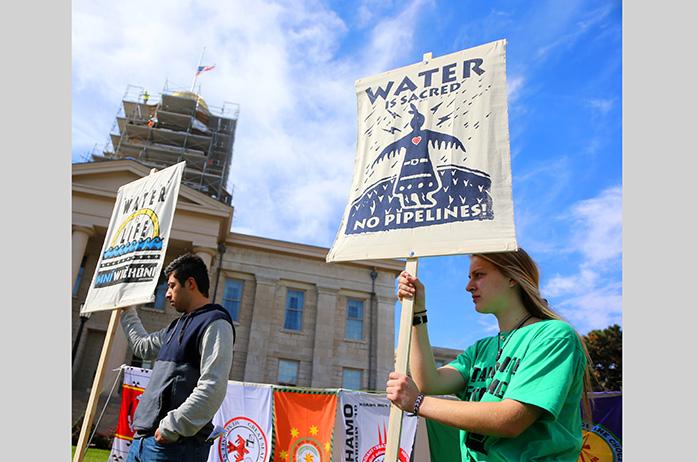By Charles Peckman
Numerous picket signs adorned the center of campus, and emotions were high Monday.
“We are here to protect — water is life,” one sign read.
Native Americans, activists, students, and educators gathered on the Pentacrest Monday afternoon to protest the Dakota Access Pipeline and mull the name changing of Christopher Columbus Day to Indigenous People’s Day.
University of Iowa alumna and pipeline activist Christine Nobiss was among a few who spoke to the crowd Monday.
She said she was physically tired because she arrived in Iowa City at 1 a.m. from Standing Rock Indian Reservation.
Besides Nobiss’ clear physical exhaustion, she said she was mentally tired, too, because the Dakota Pipeline is still being constructed, and Native Americans are still oppressed by society.
Nobiss said everyone has the opportunity to come down and fight the pipeline. “How can you help?” she asked the crowd.
“If you can walk onto a construction site, you can help,” she said. Nobiss stressed that although activists at the sites do need supplies, having a physical presence there is much more important.
She noted that Native Americans’ sovereignty goes hand in hand with the fight to end the construction of the pipeline, as well as changing the name of Christopher Columbus Day to Indigenous People’s Day.
“Our ancestors were stewards of this land, and we’re at a real tipping point now,” Nobiss said.
She urged Native Americans to band together and “learn the culture that was beaten out of our grandparents.”
The ball game has changed, however, Nobiss said. As opposed to battling people, Native Americans must now fight against powerful corporations. “Whoever has the oil has the power,” she said.
Nobiss said oil corporations are incredibly greedy, and she questioned them. “Why some of the poorest people in the nation are fighting some of the richest people in the world?” she asked the crowd.
According to the Census Bureau, the percent of Native Americans living under the poverty line is 27 percent.
“Indigenous people are getting together in huge numbers — it’s not a rally, it’s a cry for help,” said Mary Bennett, a protester at the event.
Bennett said Native Americans, and all Americans for that matter, cannot let corporate greed ruin the planet.
Jacki Rand, a UI associate professor of history, told the crowd to “reflect on the time we’re living in.”
“Tribal people are taking back their self-determination,” Rand said, adding that more and more Native Americans are practicing food sovereignty, or the right to use their own naturally sourced ingredients.
“Native American people are finally using long-held ancient knowledge about food,” she said.
Native Americans taking back their autonomy does not just end with food, Rand said. To her, stopping the Dakota Pipeline is yet another example of how Native Americans are taking back their self-determination.
“Now, we have the hard work of asking ourselves where do we go from here” she said.
Dawson Davenport, a co-head of the Native American Student Association and organizer of event, said the issues of renaming Columbus Day and stopping the Dakota Access Pipeline “coincide” with each other.
Davenport said both issues deal with the oppression Native Americans still experience today.
“Changing the name of Columbus Day lets people around the world know we’re here,” he said.
Davenport said he can both relate to these problems as a Native American and a student.
He said Native Americans, both on the UI campus and nationwide, “are simply trying to live the way of life we’ve always tried to live.”
To Davenport, being able to bring awareness to and get the message out of Native Americans’ struggles at an institute of learning is very fortunate.
“This is all very here for me,” Davenport said, pointing to his heart.



